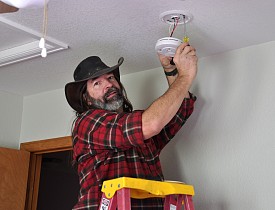The Fiery Hazards of Home Heating
 According to a recent report by the National Fire Protection Association (NFPA), nearly 1 in 5 home fires in 2009 were caused by home heating equipment. This puts heating at a very close second to cooking as the top cause of home fires. The report sites many other interesting, if grim, statistics. For example, only 12% of home heating fires are due to mechanical failure or malfunction, while 53% of deaths related to home heating fires result from combustibles being too close to heat sources; that is, from not keeping heaters a safe distance from things like drapes, clothing and furniture. As you'll see here, the great majority of home heating fires are entirely preventable.
According to a recent report by the National Fire Protection Association (NFPA), nearly 1 in 5 home fires in 2009 were caused by home heating equipment. This puts heating at a very close second to cooking as the top cause of home fires. The report sites many other interesting, if grim, statistics. For example, only 12% of home heating fires are due to mechanical failure or malfunction, while 53% of deaths related to home heating fires result from combustibles being too close to heat sources; that is, from not keeping heaters a safe distance from things like drapes, clothing and furniture. As you'll see here, the great majority of home heating fires are entirely preventable.
Space Heaters
Space heating defines a broad category of home heating equipment and includes common devices like portable electric heaters, kerosene heaters and fireplace inserts, as well as things you may never had heard of, such as "local furnaces." It also includes stoves that are designed for both heating and cooking (not surprisingly, the cooking function accounts for a good chunk of the fires with these). In 2005 to 2009, the NFPA found that space heaters as a group were responsible for 32% of home heating fires. That number seemed low to me, given the high wattages and poor design of so many space heaters on the market over the years. But then I kept reading: Space heaters cause 79% of the deaths from home heating fires. This means that space heating, in practical use, is by far the most dangerous type of heating equipment. Here are some tips to keep it safer:
- When choosing a portable heater, make sure it has temperature control and an automatic safety shutoff if the unit tips over, and that it bears the "UL" (Underwriter's Laboratories) stamp of approval.
- Place heaters on a solid, flat surface; never on carpeting, rugs or fabric.
- Turn off space heaters when you're out of the room or sleeping.
- Keep heaters at least 3 feet away from all combustibles. Never lay clothing to dry over a heater.
- Don't use extension cords to plug in electric heaters. (However, since people often ignore this advice, here's the reasoning: regular skimpy cords can't handle the power draw of some space heaters and can melt and/or short out (it happened to me once). If you use an extension cord, get a beefy one from the garage (like a 12-gauge power tool-type cord), and plug it into a GFCI outlet, if available. If any cord gets hot while running a space heater, it's too small for the power load.
Fireplaces (and chimneys)
Fireplaces and chimneys are the leading causes of home heating fires. Most of these are due to chimneys getting gunked up with creosote, a combustible byproduct of burning wood. This is what chimney sweeps scrub out of your flue (the clay or metal liner inside the chimney) and suck up with a big vacuum as part of their standard service. Preventing chimney fires is simple:
- Have the fireplace and chimney (flue) professionally inspected and cleaned once a year.
- Burn only well-seasoned (dry) wood; "green" wood produces more creosote.
- Don't burn trash, large quantities of paper, or any flammable substances (like gas or lighter fluid) in the fireplace.
- Keep combustibles well away from the fireplace opening.
Central Heating Unit
Generally, we're talking about furnaces and boilers here, and the entire group of central heaters represents 16% of home heating fires. Interestingly, liquid-fueled heaters caused over 9 times as many fires as gas in 2005-2009, while electric units caused almost 4 times more than gas. The top three causes of fires in central heating units are mechanical failure or malfunction, failure of automatic control features and faulty or damaged wiring. Dirty units, backfiring and nearby combustibles together account for about one-quarter of the fires. What this tells you is that it pays to have your furnace or boiler professionally inspected and cleaned periodically and to keep all combustibles well away from the appliance at all times.
Water Heater
Hot water heaters caused 11% of home heating fires in 2005-2009. Gas water heaters have a large gas burner near the floor, making them much more susceptible to fires related to nearby combustibles and to fumes from or direct contact with flammable liquids (water heaters in garages are installed on platforms for this reason), in addition to leaks from their own gas supplies. Fires with electric water heaters are most often related to wiring or wiring insulation failures. The NFPA recommends having water heaters installed by a qualified professional per local code requirements and to have a heater inspected in a newly purchased home or before using a heater that's been off for a long time.
Philip Schmidt is a Networx - https://www.networx.com - writer. Get home & garden ideas like this - https://www.networx.com/article/the-fiery-hazards-of-home-heating - on Networx.
Looking for a Pro? Call us (866) 441-6648

Electrical Average Costs
Electricians Experiences

Time To Replace The Heat Pump – Before It Broke Down Completely

All Our New Home’s Electrical Work Done By One Skilled Contractor



